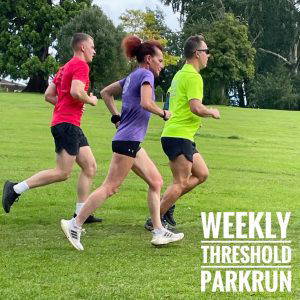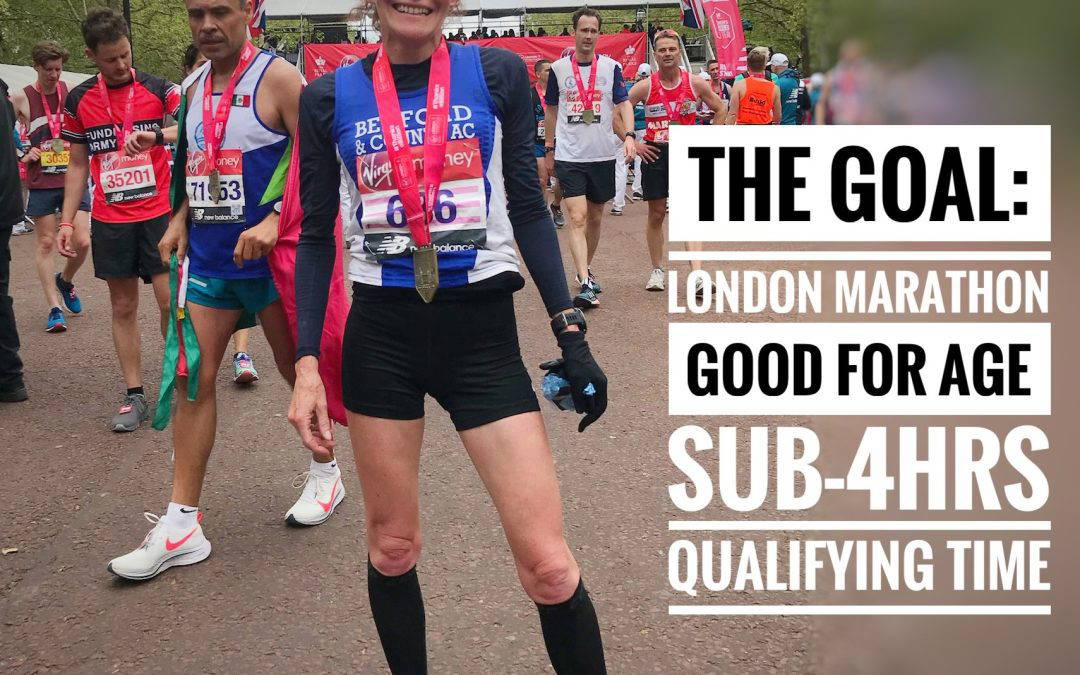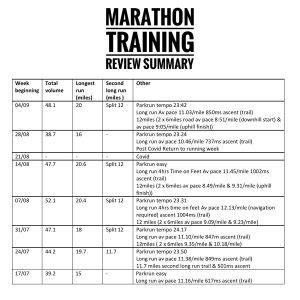The marathon runners and athletes I coach will be very familiar with this. The process of marathon training review I complete before every marathon. It helps me formulate some thoughts about how each person will run. It’s not an exact science. But it is based on several years of coaching knowledge and experience. In depth understanding of performance and marathon running from beginners to elite. Finished off with a little bit of intuition.
If you want to read more about how I do training reviews and predict marathon times, follow this link to my previous blog “How to Predict Your Marathon Time”.
More recently I have been focusing on ultra races. But in a burst of London Marathon FOMO, I decided to enter a road marathon to target the London Marathon Good for Age qualifying time. This week its race week! So here is my marathon training review. From Running Jo the Coach to Running Jo the Runner.
Why do I need to predict what I think I will run?
The biggest mistake most marathon runners make is to set off too fast. Good marathons rely on good pacing judgement and discipline from the start. Which relies on a good prediction of your likely time. This enables you to set yourself a realistic pace window. And maximise your chances of a great run on the day.
Extrapolating from recent races is a very useful guide. Your half marathon time is one indicator of potential marathon performance. But many runners underestimate the big jump in endurance from half marathon to marathon. Which leads to over confidence at the start. And haemorrhaging time in the latter stages.
So the best predictor of your potential comes from a thorough assessment of your training. Based on understanding of how training translates into marathon performance on the day.
My marathon training review
I always start with the numbers. And with this chart. Usually looking back over the preceding 8 to 10 weeks of training before the taper period. Here is mine. The key is always focus on what you did rather than what you missed. Make an objective, honest assessment of the impact of gaps in training. But do not dwell on what you did not achieve.
So, what would Running Jo the Coach say to Running Jo the Runner?
Endurance
When we look back over the preceding 8 weeks we can see there is a really strong endurance base from the consistent weekly volume. Excluding the covid and recovery week, weekly volume is regularly over 40miles per week. From past experience we know this volume is key to essential marathon endurance. It correlates well to previous marathon training blocks. What’s more the preceding ultra training built a strong foundation of aerobic endurance underpinning this block. With 40miles plus per week since March/April this year.
The number of long runs, distance and the time on feet is excellent. 20miles long runs have become the consistent base long run. Four hours “time on feet” provides an excellent foundation of muscular conditioning and endurance for the equivalent duration to your marathon. One of the reasons for debilitating cramps in the latter stages of the marathon can be severe over-fatigued in muscles. From experience matching marathon “time on feet” in training helps minimise cramps and loss of muscle function.
On top of the long runs, the second mid-week longer run helps build better depth of endurance for the marathon. The addition of the split marathon pace 12miles (6miles to the Cheltenham Harriers weekly track session to coach and then 6 miles home again) has been very beneficial to development of marathon pace and endurance.
Specificity and Marathon pace
One of the challenges has been lack of mixed intensity sessions and lack of specificity. With the focus on ultra training almost all of the runs over the last 6months have been off-road. Often on technical trails with large volumes of ascent and tricky descents. This makes the translation from long training runs to road marathon more difficult to predict.
Long runs have generally been recorded on elapsed time which includes toilet stops, hiking steep ascents, slow technical descents, nutrition breaks, stiles and gates. This means the pace is not a very accurate reflection of actual running pace. Likewise completed in un-cushioned, heavy trail shoes usually with 2-4kgs backpacks. Therefore, we assume we can deduct considerable time from the average long run pace to race pace. But the lack of specificity means this is not guaranteed.
The introduction of the weekly 12-miles road runs to and from Cheltenham Harriers each week has provided important specificity. The target was to complete as many of these miles at marathon pace as possible with a comfortable marathon pace effort. Over the block the average pace of this run plus the number of marathon pace miles has increased each week. This weekly workout should be the one which gives greatest confidence that the target marathon pace 8.50-9.00/miles is realistic.
Range of fitness and threshold
 Finally, the introduction of weekly tempo parkrun most weeks (albeit on gently undulating grass) has provided much needed change of intensity into weekly training. Generally run at or above threshold you can also see progression and improvement in these.
Finally, the introduction of weekly tempo parkrun most weeks (albeit on gently undulating grass) has provided much needed change of intensity into weekly training. Generally run at or above threshold you can also see progression and improvement in these.
Conclusions and confidence
Whilst this training block looks very different to most previous marathon blocks there are several elements that should provide great confidence. The lack of specificity and road miles has been mitigated by the weekly marathon pace road runs. The lack of intervals and mixed pace sessions has been balanced by weekly threshold parkruns. But most importantly, it has been an uninterrupted training block (aside from covid). Extending the block by two weeks allowed some additional endurance on fresh legs after the enforced covid break (thankfully mild). The weekly volume, long runs, time on feet endurance and more recent marathon pace miles suggest very strongly that the target sub 4 marathon time is well within my capabilities.
Marathon race plan
The key to all good marathon performances is good pace discipline in the early stages. For me this means keeping the early miles within the pace window of 8.50-9.00/miles. Ultra training has developed my excellent race nutrition and hydration habits. The focus for the marathon will be on Cliff blocks and tailwind rather than real food as these are easier to consume at faster paces without slowing greatly. Finally, marathon running is about focus, determination and resilience. These are qualities that develop through experience and practice especially during long training runs and previous race experience.
So all that is left to do is go out there and run. As I say to every runner I coach.
Believe in yourself. Be positive. Be determined and be confident.




